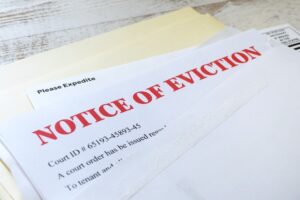Experienced Vero Beach Landlord and Tenant Eviction Lawyers
Landlords have the right to expect that tenants will pay their rent on time. When tenants miss too many payments, landlords do have the right to evict the tenant and demand payment for the balance due. Landlords can also evict tenants who violate non-rental conditions. There are strict Florida laws though on when and how to evict someone. Florida is concerned that the right of eviction be balanced with the need for everyone to have shelter. To ensure that landlords follow the proper laws and regulations, the best course of action is to work with an experienced Florida real estate lawyer.
At Lulich & Attorneys, our Vero Beach lawyers understand landlord rights and tenant rights. We prepare the correct documents so that landlords can give timely notice to tenants and comply with the state eviction laws. We explain what landlord remedies cannot be used such as changing the locks without court approval. We also advise tenants who have legitimate defenses to landlord eviction actions – such as proof that they did make the payments or that the landlord may be in violation of the terms of the lease agreement.

When can a landlord terminate a Vero Beach lease agreement?
The starting point for all eviction actions is the lease agreement. Leases should be in writing. The terms of the lease should be clear. The terms include the amount of the rent, when the rent is due, the length of time the tenant can stay in the apartment or home, the terms for renewal, and the terms for default.
The most common ground for terminating a lease is that the tenant failed to pay the rent. Additional grounds may be set forth in the lease agreement – such as that a tenant may not sublease the apartment.
Leases can also be terminated for non-rental grounds such as destroying the property being leased. Florida statute 83-56 sets forth the grounds for terminating a lease for non-rental reasons. Generally. Landlords can terminate a lease (for reasons other than a failure to pay the rent) based on Florida statute 83-52. This law requires that the tenant:
- Comply with “applicable provisions of building, housing, and health codes.”
- “Keep that part of the premises which he or she occupies and uses clean and sanitary.”
- “Remove from the tenant’s dwelling unit all garbage in a clean and sanitary manner.”
- Keep the plumbing fixtures clean, sanitary, and in good repair.
- Use the electrical, heating, plumbing, ventilating, air-conditioning, sanitary, and other facilities and appliances in a reasonable manner.
- Not damage any part of the property.
- Not unreasonably disturb any neighbors.
The landlord’s ability to terminate a lease depends on whether any of these statutory violations are considered “curable.”
Evictions for non-curable violations
Some violations, such as destroying property, are considered “non-curable.” A landlord can then begin the eviction process by giving the tenant a written notice stating that the tenant is in violation of the lease because of a specific violation. The notice should indicate the landlord’s intent to end the lease.
Evictions for curable violations

Curable violations include the following:
- Using an unauthorized parking spot.
- Failing to keep the apartment sanitary.
- Having an unauthorized guest, pet, or car.
For curable violations, a Vero Beach landlord must give the tenant notice of the violation and that the tenant has seven days to remedy the violation or come into compliance. The notice should explain that the failure to cure the violation will result in eviction proceedings. Additional conditions for beginning an eviction proceeding may apply.
Evictions for nonpayment of rent
When a tenant is behind in the rent, Florida requires that the landlord send a letter demanding payment of the rent. Tenants normally have three days to pay the rent (provided they are in default.). The letter needs to comply with the specific languages set forth in Florida statute 83.56. Our Vero Beach lawyers ensure that correct language is used.
For all types of eviction notices, we explain how the notice should be delivered.
What acts may be considered a waiver of the right to end the lease?
Landlords may be considered to have waived their right to evict a tenant if they accept rent money while knowing of the tenant’s noncompliance and for other reasons our skilled real estate lawyers can explain. Generally, acceptance of a partial payment is not considered a waiver – provided the landlord sends a new notice with the new balance due, gives the tenant a receipt, and complies with other statutory conditions.
How do our Vero Beach eviction lawyers fight for landlords?
We explain the rules and procedures for terminating a lease and processing on an eviction claim. we anticipate the arguments and defenses tenants will make to try to stall or defeat the landlord’s actions. Likely defenses include the lack of a habitable apartment, noncompliance with statutory requirements, discrimination, and other defenses.
We also explain that tenants who contest the termination are still supposed to pay the rent by depositing the rent with the local court.
Our lawyers also explain that, in Indian River County, the landlord needs to do more than just terminate the lease. The landlord, with the help of experienced eviction lawyers, needs to take several steps such as:
- Appearing at an eviction hearing.
- Obtaining a court order approving the eviction.
- Filing a writ of possession.
- Serving the writ on the tenant.
The writ normally gives the tenant 24 hours to leave the apartment.
Talk with an experienced Vero Beach eviction lawyer today
At Lulich & Attorneys, our Vero Beach eviction lawyers represent landlords and tenants when there is a written lease and when there is just an oral lease. We represent landlords and tenants when a lease is year-to-year, month-to-month, or for other terms. We handle terminations and evictions based on nonpayment of rent, curable breaches, and non-curable breaches. To speak with a seasoned or Vero Beach Indian River County eviction lawyer, call us at 772-589-5500 or complete our contact form to schedule an appointment.
